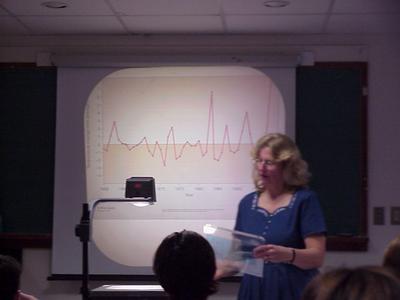
|
|
26 March, 2002
After spending time at the lab yesterday, we moved to the University
of Tennessee campus today. In the morning, I attended Dr.
Grebmeier's oceanography class to hear about the biological impact of
El Nino. Did you know that the anchovy fishery in Peru has never
recovered from the combined impacts of over fishing and the lengthy
El Nino of the early 1970's? In the afternoon, during the lab
portion of the class, students presented the results of their
research on oceanography topics. Oceanography covers a wide range of
topics. It is truly an interdisciplinary science, and the SBI project
is a great example. In order to study carbon cycling in the Western
Arctic ocean, teams of scientists will study biological, physical,
geological, and chemical aspects of the shelf, slope, and basin areas
of the Chukchi and Beaufort Seas. The cruise I will be on is one of
several in the five year long Phase II portion of the SBI project.
Phase I (1998 - 2001) involved analyses of historical data, a few
field investigations, and modeling of specific regions and processes.
SBI II will include the main field program which will take place in
the Bering "Strait region and over the outer shelf, shelf break and
upper slope of the Chukchi and Beaufort seas. The planned Phase III
will focus on development of Pan-Arctic models suitable for
simulating the impacts of climate change on shelf-basin interactions.

The subject of Dr. Grebmeier's oceanography class was El Nino and its impact on the anchovy industry of Peru.
Contact the TEA in the field at
.
If you cannot connect through your browser, copy the
TEA's e-mail address in the "To:" line of
your favorite e-mail package.
|
